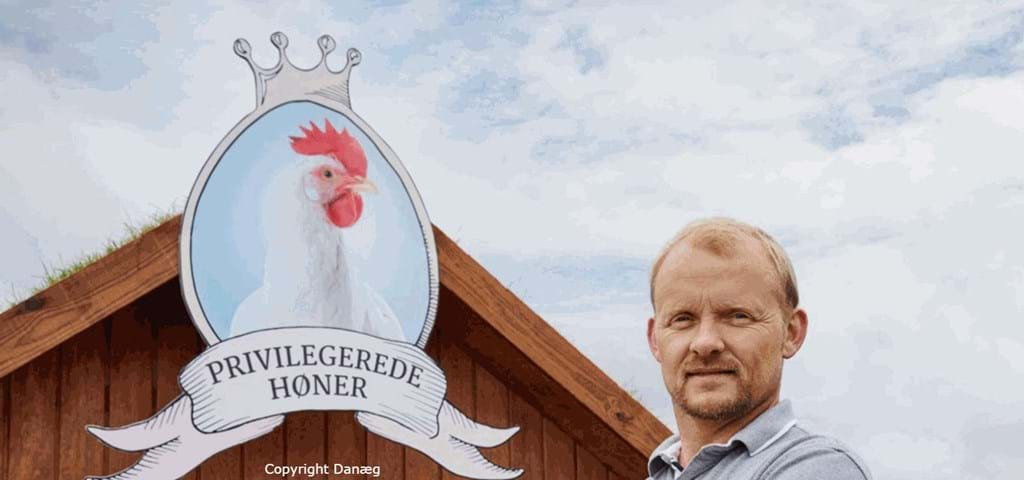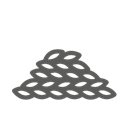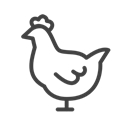
Feed mill for poultry
Saves 12 % on feed costs
Klaus Joergensen, Glejbjerg, Denmark – manufacturer of free-range eggs
At Boldinggaard, we are greeted by the complaisant, enthusiastic and different thinking manufacturer of free-range eggs, Klaus Joergensen. Klaus and his wife, Betina, are the owners of Boldinggaard poultry farm, which is situated in Glejbjerg between Esbjerg and Holsted in the south-west region of Denmark. They built the farm in 1995.
Klaus has been producing eggs for 21 years. In the beginning, he had 10.000 free-range chickens, in 2002 he had 25.000 and today he has 48.000 chickens divided between two stables with app. 8000 in each flock.
Besides the free-range chickens, he also has 140 hectares of land of which 30 hectares are leased. On the remaining 110 hectares, he grows wheat among other things, which is being mixed in the chickens feed.
From wholesale bagged feed to homemade feed
In May 2016, Klaus started producing his own feed for the chickens, and today he produces 60-65 % of the feed. He has a grinding/mixing plant from SKIOLD with a SK5000 disc mill, screen cleaner and FlexMix control system, which mixes two different kinds of feed and the plant has run without problems. The chickens feed consists of 65 % wheat, 7 % shells and 28 % supplements and app. 2500 tons feed are used yearly. At the moment, 100 kg wholesale bagged feed costs app. 182 DKR and it costs app. 160 DKR to produce 100 kg feed. This means that the return of investment is app. 3 years.
On the neighbouring farm the day-old chickens are kept until they are app. 16 weeks old. The chickens come from a hatchery on Zealand. When the chickens are 0-8 weeks they are fed bagged feed and from 8 weeks old, they are fed feed for adult chickens. At 16 weeks they are moved to Boldinggaard. The mortality is very low – from 0-16 weeks the mortality rate is 0,7 %. Klaus hardly uses any medicine for the chickens. If the chickens are in need of medicine, they will receive it in their drinking water.
When the chickens are 20 weeks old they start laying eggs and at the age of 22 weeks, they start laying eggs that can be sorted. The chickens produce app. 15,5 million eggs per year. The light is turned on at 2 am at night. This tricks the chickens to believe that it is dawn and they start to lay their eggs. By 6 am, 95 % of the eggs are already laid.
Klaus is one of the largest producers of free-range eggs and he sells his eggs to Danaeg A/S. Danaeg is a cooperative and is owned by the farms who produce and deliver the eggs. The suppliers produce both organic, free-range, barn eggs and cage eggs. Cage eggs are slowly being phased out and are expected to be completely phased out by year 2020.
Stressed chickens – no thank you!
To obtain the best quality, it is important that the chickens do not get stressed as this results in bloody eggs. From an early stage, the chickens are exposed to noise and Klaus and his assistant make sure always to wear a blue boiler suit that the chickens recognize.
The chicken faeces are removed directly on a conveyor belt, which ensures a better indoor climate.
Klaus’ chickens are part of Danaeg’s concept ”Privileged Chickens”. Privileged chickens have access to a varied terrain. The chickens can also take sand baths and climb which helps to keep them engaged. Besides the extra privileges, the free-range chickens have also access to an outdoor area and a minimum of one third of the poultry house is covered with straw, wood shavings, sand or peat and the chickens have nests and perches available.
”It’s all about management. When the chickens are thrieving, my bank account is thrieving”, says Klaus Joergensen.
When Klaus is not looking after his chickens, he enjoys spending time on one of his favorite hobbies, classic cars. Klaus and Betina enjoy meeting new people and therefore it is possible for people to camp at Boldinggaard for free.


 English
English
 Danish
Danish
 French
French
 Swedish
Swedish
 Vietnamese
Vietnamese
 Spanish
Spanish
 German
German
 English
English







